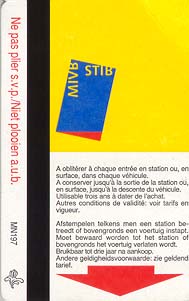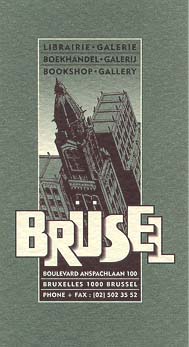Brussels, part I
I hate Brussels. At least, that's what I thought. I lived in that town for four years, and when I left, it felt like a relief. Our stance towards the cities we live in is a sentimental affair, albeit rooted in factual realities. And on that level, it is easy to dismiss Brussels as a desperate case.
Almost everything related to this city is wrong. Its architecture, its schools, its councils, its police, its social planning... you name it. Years of mismanagement and corruption have contributed to the decline of a city once hailed as an enlightened metropolis, rivalling with Paris.
Today, it is an ugly, disfigured and insipid city where discrepancies of all kind abound. So when Michel said that life in Washington resembled that in Brussels, I didn't know what to think of it.
Michel
I left some dear friends in Brussels, and once in a while I go and visit them. Last week, I spent five days doing exactly this. I met Michel at my host's place, a common friend. He's in Belgium for two months, redoing his teeth, which is something cheaper to do in Belgium than in the USA.
Michel is a seventy two years old writer. Until four months ago, he was living in Belgium, but then he met an American woman, and he moved to Washington. I don't know what kind of love ties them together, but what I do know is that it all happened very fast.
Michel has written five books. His last manuscript was turned down by his publishing house. They said it was too violent to fit in their catalogue. I asked him why he didn't try to publish somewhere else, suggesting that small, independent publishing houses might be waiting just for that: an established author that turned vociferous. But Michel wasn't talkative. He said he had switched to painting anyway. That if he'll ever write again, it would be in english (and not dutch).
I tried to get more out of him, but I didn't get the response I was waiting for. I didn't insist.
Suck
Before I went to sleep, my host handed me over some reading material. A pile of yellowish journals from the sixties that Michel had left there in custody. Two titles stood out from the rest, because there were many issues of them. One was Real Free Press, an undergound comics publication, the other was Suck, a paper claiming to be the first European erotic magazine.
Both magazines had their headquarters in Amsterdam and both carried that same subversive spirit that nourished the zeitgeist. I leafed through them with interest, gradually immersing myself in the sixties and its concerns.
And then I realized something. Reading an underground comics zine from the sixties is an experience that doesn't alienate as much as reading a sex paper from that same period. Underground comics have evolved into a solid tradition, and what has been done in the sixties transpires as the source, the roots of that tradition. But reading about sex from the sixties is something completely different.
Let me give you an example. On page two of Suck issue number two, you can see one of the editors posing in front of the camera. She's naked, her legs apart and arched upwards, smiling from in between her buttocks. Soon you realize that editors took an active part in the pictures and stories used in the magazine. Also, there's no discrimination between homosexual and heterosexual material. And finally, kids are also in the picture.
Friendly families fuck together, says the title of a story. In it, a father of two tells about the shared sexual life of the family, promoting its benefits and regretting the position of the law on that matter.
Brussels, part II
On the newsstands, local papers display huge titles concerning pedophilia and corruption affairs. One year has passed since Dutroux. A tormented year during which many frauds of the state have been told, while others are still being unraveled.
I decide to not let these things occupy my mind. It's my last day in Brussels, and I want to do things I enjoyed doing while I lived here. Among those: eating a soup and a sandwich at "Au Suisse". Touring some records shops (Harlequin, Music Mania). Sit in cafés (Le Soleil, Zebra). Touring the BD - comics - shops (Brüsel, De Schaar).
Brussels is a haven for specialized shopping. People don't live outdoors, the city's too grey for that. So they create universes in their bedrooms, assembling music or books or clothes or antiques...
The homemade soup and sandwich were delicious, and I bought a couple of nice records and comics too. I took the train and left Brussels as someone who thinks has found a better place. And then I remembered something a friend had said to me two days earlier. He told me that what fascinates him with big cities was their abstraction. Cities are containers of numerous shapes and perspectives, always different, never static. Cities produce complex patterns of traffic, not only in the sense of transportation. Oceans of bodies and faces, night sceneries, building blocks aligned on checkerboards. Finally, cities entertain an exhilarating promise: at any moment, one among the thousands is likely to cross your path, and there's a chance he'll make your day. There's even a chance he'll change your life forever.
Surely there's some poetry to be found in Brussels too.
© Daniel Szmulewicz, 1996 - 2011

